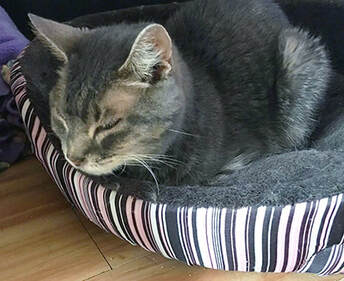
As with humans, cognitive dysfunction or dementia in cats is more prevalent the older they get. Because of this, protective pet parents must become proactive pet parents to ensure their cherished companions receive the extra care they require.
For senior cats without a specific disease or injury, these are some of the most common behaviors associated with their overall physical and cognitive decline:
Confusion and disorientation: Many cats may appear lost or confused in familiar surroundings, including their own home.
Changes in responsiveness: Cats may appear to not recognize family members and may respond poorly to formerly familiar commands.
Vocalizations, restlessness and/or new sensitivities: Some cats may begin to perform repetitive behaviors or vocalizations such as whimpers or howls, become more restless and/or become more sensitive to loud noises.
Reduced activity: Not only will most older cats slow down physically, they may also eat less, groom themselves less, and become less affectionate.
Changes in the sleep-wake cycle: Many senior cats experience disruptions in their sleeping pattern.
Changes in house training: Many seem to lose their housetraining skills causing them to have frequent accidents outside their litter boxes.
To provide the best possible care for your senior cat, have her thoroughly examined and tested by your vet. The results will reveal whether her new behaviors are due to some other condition or to dementia.
If your cat is indeed suffering from dementia, your vet may prescribe a psychoactive drug to improve her brain function. One such drug, Anipryl, is most often used to treat dogs with dementia, but the American Association of Feline Practitioners supports its use in cats – with varying degrees of success.
While there’s no cure for dementia, you can slow down the signs and keep your cat as content and comfortable as possible by feeding her a healthy diet, increasing her exercise regime, including games to stimulate her brain, and taking her to the vet every six months.
The best diet for cats with dementia is one that’s high in antioxidants -- vitamins C and E, beta carotene and essential fatty acids (Omega-3’s), to which your vet may suggest adding other vitamins and/or supplements. It’s also essential that you keep your cat on a fixed feeding schedule to reduce the chances of her becoming confused.
Do your best to be patient and gentle with her. Try not to get frustrated, remaining as calm and supportive as possible. Since companionship is key, keep her engaged with the other members of your family even if she seems to have forgotten them. To keep her “centered”, never rearrange your furniture or make any changes in what, to her, are familiar surroundings. Increase “environmental cues” such as leaving a radio on in rooms she frequents so that she can follow the sound. Remind her of the basic commands she’s forgotten by retraining her – from where to potty to where to sleep.
But above all, remember she’s the same cat you’ve always loved and who’s always loved you, and that, with all the resources at your disposal, your time together can still be quality time.









 RSS Feed
RSS Feed